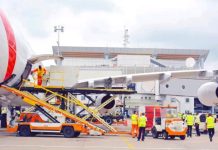Modern technology has been identified as a major component to transition African airports to be among the top players in the world of airports business. Speaking at the 59th ACI Africa 2018 conference, the Associate Director Airport Service Quality (ASQ) at ACI World, Dimitri Coll explained that today’s challenges in airports will not be solved by the old management methods supported by yesterday’s technology. There is, therefore, a need for African airports to employ the use of modern technology in airports, with focus on adding more self-service preference for air travelers.
Business transformation cannot be accomplished with outdated platforms, aging IT systems and expensive error prone natural processes. Managers need the next generational technology that transforms airports and respond effectively to the regulatory and commercial imperatives of future airports.
Airport leaders acknowledge that business success is not just about the deployment of new technologies, simply because IT systems and applications change too quickly. Instead, success is about transforming the business of airports, adapting to customers, staff, community and cultures and leveraging existing and new technologies to meet objectives and goals
Digital transformation for the airport according to ACI is about evolving processes and services to deliver a better experience to all passengers and customers, by adopting and implementing new technologies and integrating them with existing ones. From the viewpoint of the passenger, a better experience means a personalized and individual experience which offers a seamless flow through the airport. It starts before the passenger even arrives at the terminal, and this means the integration of systems and services, including those provided by partners such as airlines, security, customs, concessions, ground handlers, etc.
Employing the use of modern technology will not only ensure seamless operations in the airports by tackling service disruptions, providing real-time information, business intelligence and proactive control over operations, it will also help improve revenue.
Digital transformation will be advantageous to passengers in the aspect of baggage tracking, navigating the airport, shopping eating and relaxing. Passengers are also able to get flight, airports and parking information. On the part of the stakeholders, business efficiency is assured where information and intelligence merge together.
The whole idea is to transform the airport into a place where you can enjoy and carry out your activities hassle-free.
To improve the customer experience and enhance operational efficiency both on the ground and in-flight, some of the technologies identified and expected to reshape the face of airports business include baggage tracking, use of biometrics and blockchain, the use of Artificial Intelligence(AI), robots, Augmented Reality (AR) and Virtual Reality (VR).
Considering that employing modern technologies amount to high energy consumption, airports operators and most especially government have been employed to harness other forms of energy creation such as solar and wind energy. It’s of importance however that energy provision should not be considered in isolation.
While the aviation industry in Africa awaits the on-going digital transformation being experienced across the industry in other parts of the world, expectations are that it will bring about a new and effective twist in a customer experience and operational benefits.















